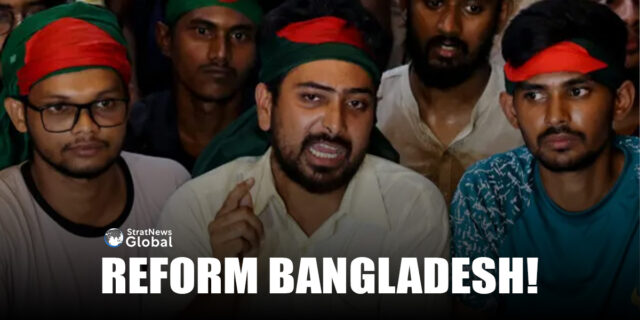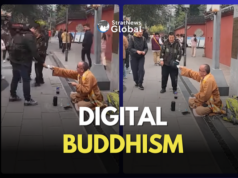Bangladesh student leader Nahid Islam, who was in the vanguard of the protests that toppled Prime Minister Sheikh Hasina, says the aim is to reform the country and its structures, not just prepare for elections.
“The spirit of the movement was to create a new Bangladesh,” he said in an interview, “one where no fascist autocrat can return. To ensure that we need structural reform, which will definitely take some time. But this will happen once we reach a political understanding with all the parties. There has been no discussion of a three month tenure (for the interim government).”
Islam is a student of sociology and is often seen with a Bangladesh flag tied around his forehead. He is convinced that the “new generation”, meaning the students, will be the driving force behind the country.
“I firmly believe the new generation is ready and fit to lead Bangladesh,” the student leader said.
He said the movement did not have any one leader. The general public and the students took on leadership roles. This is what propelled the movement forward and when the government detained the coordinators of the movement, it backfired since the people took control.
“The massive flood of people was unstoppable. If the army had cracked down on this flood of people, it would have faced revolt and rebellion from within its own ranks,” the student leader turned public hero said.
Islam and fellow student Asif Mahmud are members of the interim government headed by Nobel Laureate Mohammad Yunus. Among the 300 people who died in the protests were many students. Islam was detained as the protests gathered steam, a development which propelled him to national fame.
He is clear that Sheikh Hasina must stand trial for her crimes committed during 15 years in office.
“The mass murders and looting that occurred during Hasina’s tenure, along with corruption, enforced disappearances and the stripping of voting rights are all serious issues involving her and her government,” he warned, “they will be brought to justice. Once they face proper trials, it will be up to the people to decide whether the Awami League will be allowed to return to politics.”
With Reuters inputs
Thirty eight years in journalism, widely travelled, history buff with a preference for Old Monk Rum. Current interest/focus spans China, Technology and Trade. Recent reads: Steven Colls Directorate S and Alexander Frater's Chasing the Monsoon. Netflix/Prime video junkie. Loves animal videos on Facebook. Reluctant tweeter.





